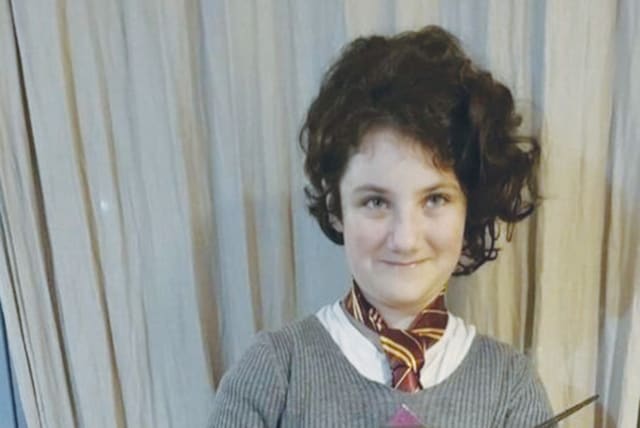Remembering Noya Dan on Autism Awareness Day

It would have taken just a little humanity for Hamas to leave this girl and her grandmother alive, but the terrorists possessed no such humanity.
Every year ahead of April 2, which is World Autism Awareness Day, I write a piece about what has happened recently in my son Danny’s life, since he is on the autism spectrum, and look at how that connects to issues that affect people with autism all over the world in the past year. Usually, it takes me a while to figure out what to focus on in this article.
Not this year.
I knew months ago that I would write about Noya Dan. You may not remember her name. She was a 13-year-old on the autism spectrum, and she and her grandmother, Carmela, were among the over 240 people taken hostage by Hamas from Israel on October 7 – they were kidnapped from Carmela’s home on Kibbutz Nir Oz, where Noya was staying on the Simhat Torah holiday – and then, nearly two weeks later, their status was changed to being among those 1200 people murdered by Hamas on that day, when their bodies were discovered. Officials believe they were initially kidnapped and then murdered en route to Gaza.
One tragedy among so many. But this one gripped me especially hard because she was on the spectrum. Her story also touched Harry Potter author J. K. Rowling because Noya was a huge Harry Potter fan, and a photo of her dressed as Hermione circulated on social media and reached Rowling while Noya was still missing. Rowling reposted the picture on X, saying, “Kidnapping children is despicable and wholly unjustifiable. For obvious reasons, this picture has hit home with me. May Noya and all hostages taken by Hamas be returned soon, safely, to their families.” When Noya’s body was found, J. K. Rowling posted, “I have no words.”
Galit Dan, Noya’s mother and Carmela’s daughter, who lived with her family on the nearby kibbutz, Kissufim, said, during the days when Noya and Carmela were listed as missing, “Noya is my eldest; she is mine alone. I’m a single mother, and she’s a uniquely special child.” She also released her daughter’s final terror-filled voice messages, and told KAN Public Broadcasting in an interview, “Just because she is autistic doesn’t mean she doesn’t understand. She understands everything.”
War takes a disproportionate toll on the disabled
It would have taken just a little humanity for them to leave this girl and her grandmother alive, but the terrorists possessed no such humanity. Noya was not the only person with special needs murdered by Hamas on October 7. Ruth Peretz, a 17-year-old with muscle atrophy and cerebral palsy who was confined to a wheelchair, was murdered with her father at the Supernova music festival near Re’im. Many obviously ill and elderly people were murdered and kidnapped as well, and people who work with those on the autism spectrum were taken hostage as well.
THERE ARE, of course, also people with special needs in Gaza, who are suffering terribly now due to the war. Given that there are 400-plus kilometers of tunnels with ample space for thousands to take shelter, one can hope that they have been given sanctuary, food, and medicine there. This is a naïve hope, of course. The Gazans with special needs and their families interviewed recently by Time Magazine had not been offered this option, as it seems virtually no Gazan civilians have.
War tends to take a disproportionate toll on the disabled and anyone who has a family member with special needs worries deeply for their safety when there is a conflict. As the sirens sounded on October 7 and we all ran to bomb shelters, I immediately sent a message to check on my son’s well-being, because he was in the village where he lives and works on that weekend. The village’s director quickly sent a message to all the parents, assuring them that in spite of the dozens of missile alerts and the fact they had only a minute to make it to the shelter when the sirens sounded, they were all fine.
Nevertheless, I considered going to pick him up, but as I saw on the news that terrorists had infiltrated within 40 minutes of the village where Danny lives, I had no confidence that we would be safe on the roads, so we both stayed put. Making that decision, which I had anticipated only in what I thought of as my most far-fetched nightmares, was a terrifying moment.
Some American friends reached out to me early during the war, filled with concern for Danny, not knowing where his village is located, and frightened it might be in the Gaza Envelope region. Several friends in the US told me that their doors were open to my children and to me, that we could come immediately and stay as long as we wanted or needed, pleading with me to move back to the US permanently.
This was touching. But, as I pointed out to them, I was not sure what Danny would do all day if we were to return to the US. In his village here, he works in several crafts workshops, making wooden toys, weaving cloth out of wool, and learning new skills all the time. Families pay a nominal fee that covers extra expenses, just a couple of hundred dollars a month, and the rest is paid by government and private donations.
If I were to find such a place in the US that would take Danny – a big if as there are long waiting lists for excellent places like this – it would cost about $200,000 per year at least, money my family doesn’t have. My friends shrugged, as if Israel’s commitment to caring for special-needs people were some quirk that kept me tied to this country. I knew that they were just worried and didn’t understand what we would be giving up if we left.
There is huge room for improvement in Israel's approach to autism
TO BE fair, there is huge room for improvement in how Israel provides for people on the autism spectrum, which I have written about in the past. In recent weeks, some programs for those on the spectrum have seen their funding abruptly cut, which struck fear in the hearts of all families of Israelis with autism, even as superfluous ministries were given extra money. But there is no denying that Danny attended mostly excellent public schools and has been part of several well-run programs since he finished school nearly seven years ago, none of which I could have afforded in the US.
Many US Jewish autism families have reached out to me to inquire about moving to Israel so their children could attend schools and post-school programs here over the years. I have never heard of a family moving from Israel to the US so their special-needs children could receive better treatment. It may have happened, but I have never been aware of it.
And that brings me back to Noya Dan, and to her mother, whose grief I cannot imagine. She moved to a kibbutz in the South seeking a good life for Noya and her other children, as I moved here hoping for the best for Danny. Judging from the photos of Noya enjoying herself with family and friends, including the one of her dressed in her Harry Potter-themed costume on Purim not so long ago, her mother was absolutely right. Noya had a wonderful – if far too short – life and my heart goes to her mother and the other surviving members of the family.
I think about Noya as our life goes on during the war. Danny has grown up in Israel – he was four when we moved here from New York, and he is about to turn 28 – so running to shelters is not completely new to him. Of course, it does frighten him but the staff where he lives have worked tirelessly and expertly to calm the residents’ fears. The staff gave up their days off and postponed their vacations following the outbreak of the war, showing great selflessness, as they did many times during the COVID-19 pandemic.
Most places that work with people with special needs rely on volunteers to help them make do with the low budgets they receive and following October 7, the vast majority of volunteers from abroad returned to their home countries, understandably. But a couple who came to work at Danny’s village a few years ago from abroad chose to stay. When I tried to thank them, they acted like it was no big deal. But it is a big deal, it’s a very big deal what the staff and volunteers have done to make Danny and all the residents feel safer.
When he is home for the weekend lately, I keep the news off, and try to focus on my gratitude for how well he is doing. All we can do now for our children on the spectrum is to love them, value them, and try to help them keep learning, as we hope for better days.
The writer is a movie critic and cultural correspondent for The Jerusalem Post. Her novel, If I Could Tell You, is about four families with children on the autism spectrum. It’s available on Amazon.
Jerusalem Post Store
`; document.getElementById("linkPremium").innerHTML = cont; var divWithLink = document.getElementById("premium-link"); if (divWithLink !== null && divWithLink !== 'undefined') { divWithLink.style.border = "solid 1px #cb0f3e"; divWithLink.style.textAlign = "center"; divWithLink.style.marginBottom = "15px"; divWithLink.style.marginTop = "15px"; divWithLink.style.width = "100%"; divWithLink.style.backgroundColor = "#122952"; divWithLink.style.color = "#ffffff"; divWithLink.style.lineHeight = "1.5"; } } (function (v, i) { });

